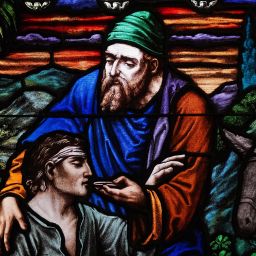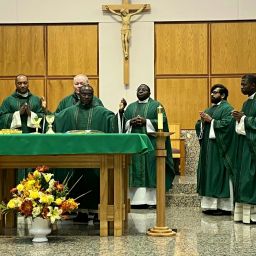
By Father Jacob Dankasa
Special to The Texas Catholic
The Scripture story of the parable of the two sons (Matthew 21:28-32) tells us something very important about our approach to faith and the things of God. In this parable of Jesus, a man gave his two sons a task — go work in the vineyard. The first son clearly told the father that he would not go, but he later changed his mind and went and worked. The second son immediately agreed to go and do what the father asked, but he failed to actually go.
I refer to this parable as the parable of the resisting sons because both sons resisted at one time or another. The first son resisted at first but changed his mind later and went to do what the father requested of him. The second son accepted at first but later had a change of mind and resisted. So, in both cases there was a case of resistance, but one was at the beginning and the other later on. Jesus gave us this parable to show the importance of a positive change of mind toward God and the danger of falling away from God.
These two cases could be described as examples of what I will refer to as internal and external resistance to faith. An external resistance to faith is a publicly known and expressed rejection of the things of God. People who are known to be anti-religion, who reject any act of God, who do not believe the Scriptures, who do not go to church, who are not associated with Christianity, and who are always pushing back on the teachings of Christ and His Church — these are examples of external resistance. They are not ashamed or afraid to publicly express their rejection of the things of God. This kind of resistance, though bad, can be remedied. People like these can be helped to come to know God. Because their views are known publicly, they can be approached through targeted evangelization. It is possible for people like this to be helped to change their minds and turn to God, because they are known and can be approached. They can be compared to the first son in the parable, who first said “no” to his father’s request. But the father — or perhaps someone or something else — persuaded him to go, and he had a change of mind and did what the father requested. In this parable, Jesus showed how the tax collectors and prostitutes — known public rejectors of God’s words — were turning to God because of the preaching of John the Baptist and Christ Himself.
Internal resistance to faith, on the other hand, can be described as a situation in which someone accepts the faith publicly, goes to church every Sunday, identifies as a member of a faith or a church, even participates in the activities of the faith — but deep inside the person has no place for God in his heart. His external expression of faith could just be acts of “going along with others” or social identification, but deep inside, the faith is not rooted — there is no commitment. Such a person can be doubtful or even deny the truth of the Scriptures. If he is Catholic, he may not even believe in the teachings of the Church. He is known publicly as a person of faith but, deep inside, he is far away from God. This attitude can be described as internal resistance. And this may be more harmful to one’s soul than external resistance, because the person who is internally resistant appears to be following the teachings of Jesus. He may not find any help from others because people who could help him may not know about his internal struggles and thus may be unable to render spiritual support or clarity. All that people know is that this person is a man or woman of faith but, in reality, the person’s heart is not in God. Unlike the external resistance that people know about and can help to remedy with kindness and evangelization, those who are publicly viewed as people of faith but are internally resistant may not necessarily be targeted by evangelization; it may be assumed that they are strong in faith since their internal struggles are unknown.
This internal resistance can be compared to the second son in the parable, who said to the father, “Yes, I’m going to do it,” but did not go — he wasn’t saying what he really meant. We, as followers of Christ and members of his Church, must be careful not to fall into the camp of internal resistance, where we appear as faithful members of the Church from the outside, but our inside is full of rejection of God and faith. This parable of Jesus calls us all to an opening of heart that will neither internally nor externally resist God’s words. We are called to a true fellowship with Christ in faith and truth. We people of God must be both internally and externally open to God’s invitation and positively respond in such a way that we will be true and sincere in our response.
Jesus’ door is not closed to anyone. Those who are externally resisting Him can find the way to Him through our reaching out to them with the Gospel and living lives as example of that Gospel. We will be unable to evangelize those who externally resist God if we who publicly proclaim Christ are far away from him in our heartfelt convictions and internal actions.
Any follower of Christ who finds difficulty understanding God and things of faith should be open in expressing these feelings; then he can find help and guidance from the Church and from other people of faith. We must strive to develop a faith in which both our internal and external convictions are in conformity with the life and teachings of our master — Jesus Christ.
Father Jacob Dankasa is the pastor of Holy Family of Nazareth Catholic Church in Irving.















